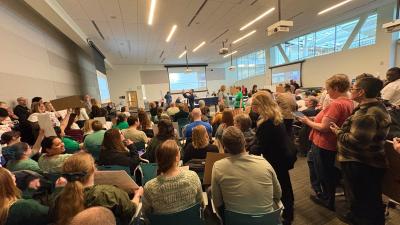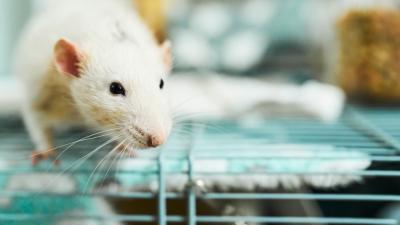Maryland Bill Will End Animal Use in Medical Education
House Bill 289 Will Modernize Training at Maryland Medical Schools
WASHINGTON—On Thursday at 1 p.m., the Maryland House of Delegates will hold a hearing on House Bill 289, which would end animal use in medical education and training. Johns Hopkins University is the only school in the state—and one of two in the United States and Canada—that use animals for medical education. The bill specifies that if replacement nonanimal methods are being used by at least one other medical school in the State, no other medical school may use an animal in medical education or the training of students.
“My alma mater, Johns Hopkins, has always been a leader in medical training, with the exception of this single area—introductory surgical instruction,” says former Maryland state secretary of health and mental hygiene Martin Wasserman, M.D., J.D., F.A.A.P, of Ellicott City, who will testify at the hearing. “Maryland should adopt this legislation before Johns Hopkins University School of Medicine is the only U.S. medical school still using animals to teach students.”
“Using live pigs to teach medical students about how the human body works is unnecessary and outdated. Surgical skills can be taught using modern simulators which are currently used at 99 percent of medical schools in the US and Canada,” says Richard Bruno, M.D., of Baltimore, in his written testimony. “I encourage the Johns Hopkins University School of Medicine to join the overwhelming majority of medical schools and retire their surgical skills pig lab.”
The University of Maryland School of Medicine provides medical training using simulators and virtual reality techniques, and the Department of Defense’s medical school, Uniformed Services University in Bethesda, stopped using animals in 2013. However, at Johns Hopkins, medical students are instructed to make incisions in a pig’s abdomen and insert long tubes with cameras called endoscopes into the pig’s body. This causes severe injuries, and the pigs are killed after the procedure. Johns Hopkins already owns the human-based devices needed to replace the use of animals immediately.
Violators of the act will incur a penalty of up to $1,000 for each animal used. The effective date for the bill is Oct. 1, 2016. HB289 was introduced in the 2015 session as HB1248.
WHAT: A hearing for House Bill 289, which would modernize training at all Maryland medical schools by prohibiting animal labs for student training
WHEN: Thursday, Feb. 11, at 1 p.m.
WHERE: Maryland House of Delegates House Office Bldg. Room 240, 6 Bladen St., Annapolis, MD
WHO: Delegate Shane Robinson of District 39, Montgomery County, introduced the bill and will present it at the hearing;
Other original co-sponsors, include: Delegates Barkley, Bromwell, Carr, Cullison, Frush, Kelly, Korman, Kramer, Luedtke, A. Miller, Moon, Patterson, Platt, Smith, Tarlau, Waldstreicher, K. Young, and P. Young
A panel of physicians will speak in favor of the bill: Johns Hopkins Medical School graduates Martin Wasserman, M.D., and Barbara Wasserman, M.D., of Ellicott City; and Pradip Sahdev, M.D., F.A.C.S., of Kensington.
Richard Bruno, M.D., of Baltimore and Eric Wargotz, M.D., of Queenstown have provided written testimony.
Twenty-five Maryland physicians have signed a letter in favor of the bill.
For an interview with a physician or Del. Robinson or a copy of the physician letter or written testimony, please contact Reina Podell at 202-527-7326 or RPodell [at] PCRM.org (RPodell[at]PCRM[dot]org).
Founded in 1985, the Physicians Committee for Responsible Medicine is a nonprofit organization that promotes preventive medicine, conducts clinical research, and encourages higher standards for ethics and effectiveness in education and research.








